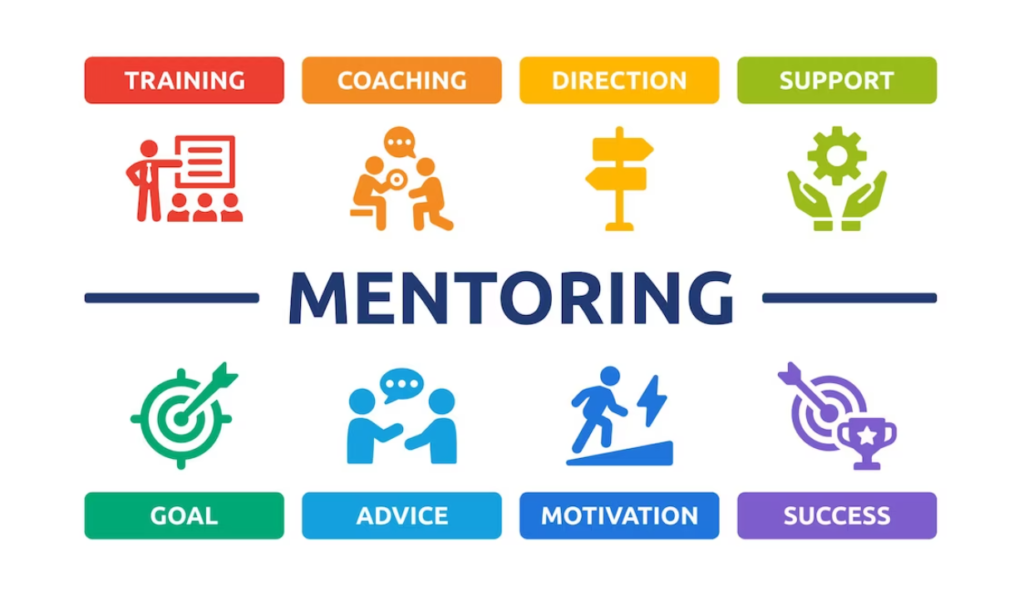In the journey of professional success, one of the most valuable relationships that can shape and accelerate career growth is mentorship. A mentor can play a pivotal role in providing guidance, support, and insight that helps individuals navigate their career paths more effectively. Whether you’re just starting out in your career or looking to make the next big leap, mentorship can make all the difference.
What is Mentorship?
Mentorship is a professional relationship where a more experienced individual (the mentor) provides guidance, advice, and support to a less experienced individual (the mentee). While mentorship is often associated with career development, it can extend beyond work to personal growth, skill-building, and self-improvement. Mentors share their wisdom, expertise, and life experiences to help their mentees make informed decisions, develop essential skills, and avoid common pitfalls.
Why Mentorship Matters for Career Growth
- Guidance and Direction
One of the most significant advantages of mentorship is the guidance it provides. A mentor, having been through the ups and downs of their own career, can offer invaluable advice on how to navigate complex situations. They can help mentees understand the importance of making the right choices and prioritizing key goals. For example, a mentor might advise on which skills to develop or suggest networking strategies that will be beneficial for career advancement.
In a world where career paths are not always linear, a mentor helps mentees identify opportunities they may have missed or help them course-correct when they feel stuck. A mentor’s ability to provide direction gives mentees the confidence to take bold steps and make strategic moves.
- Knowledge Transfer
Mentors bring years of experience and expertise to the table, which they willingly share with their mentees. This wealth of knowledge is one of the most valuable aspects of mentorship. A mentor can teach practical skills, industry insights, and technical knowledge that would take years for a mentee to acquire on their own. By learning from someone who has already succeeded, mentees can avoid common mistakes and fast-track their own growth.
Furthermore, mentors can provide mentees with unique perspectives that broaden their horizons. They can share insights on industry trends, evolving job markets, or tools and technologies that are essential for career advancement. This knowledge transfer goes beyond just tactical advice and deepens a mentee’s understanding of their profession.
- Networking Opportunities
A mentor’s network is one of their most valuable assets, and through mentorship, mentees can gain access to this network. A mentor often introduces their mentee to key individuals, whether it be other professionals in the industry or influential leaders. This expanded network can open doors to career opportunities, collaborations, and partnerships that would have been otherwise inaccessible.
For mentees, leveraging a mentor’s network can be one of the quickest ways to grow their professional connections. Moreover, mentors can teach mentees how to build and maintain their own professional networks, which is an essential skill in today’s interconnected world.
- Confidence Building
A good mentor doesn’t just impart knowledge—they also boost their mentee’s confidence. Starting a new job, pursuing a promotion, or making a career change can be daunting, but a mentor is there to offer emotional support and encouragement. They act as a sounding board, providing reassurance during challenging times and celebrating successes.
Mentorship helps mentees become more self-assured in their decision-making and professional abilities. Having a mentor who believes in them can be a huge confidence booster, which translates into a more proactive and motivated approach to career growth.
- Goal Setting and Accountability
A mentor can help their mentee define clear, actionable goals and establish a roadmap to achieve them. Without goals, career progression can feel aimless or disjointed. However, with a mentor’s guidance, mentees can set realistic objectives and measure their progress over time.
Mentors also hold mentees accountable. In a career, it’s easy to get distracted or procrastinate, but a mentor encourages their mentee to stay focused and stick to their goals. They act as a reminder to keep moving forward, especially when the journey gets tough.

- edImprov Decision Making
Career decisions can be overwhelming, especially when faced with multiple options. A mentor helps their mentee approach these decisions with a clearer perspective. Instead of rushing into a choice, a mentor encourages the mentee to weigh their options, consider the long-term impact, and make informed decisions.
For example, a mentor can help a mentee assess job offers, choose between career paths, or decide whether to go back to school. Having a mentor in these situations provides much-needed support, and it can ultimately lead to better, more calculated career moves.
- Leadership Development
Mentorship is not only about improving individual performance—it also plays a significant role in developing leadership qualities. By observing a mentor’s leadership style, mentees can gain insight into how to manage teams, make decisions, and inspire others. A mentor can teach their mentee the finer points of leadership, such as effective communication, emotional intelligence, and conflict resolution.
For mentees aspiring to take on leadership roles, mentorship is an invaluable tool in honing the skills needed to lead with confidence and success. A mentor’s wisdom can guide them through the transition from being an individual contributor to a leader, ensuring they are better equipped for the responsibilities of leadership.
- Building Long-term Relationships
A mentor-mentee relationship doesn’t have to be temporary. Many mentorships evolve into long-term professional relationships. As mentees advance in their careers, they may become mentors themselves, creating a cycle of knowledge transfer and growth. The bond formed through mentorship can lead to lifelong connections, friendships, and opportunities for collaboration.
A mentor often stays invested in their mentee’s career long after the formal mentorship has ended, offering continued guidance and support. This continuity helps mentees stay on track and keeps them connected to a valuable resource as they progress through different stages of their career.
How to Find a Mentor
Finding the right mentor requires some thought and effort. You need to identify someone whose values align with yours and whose experience is relevant to your career goals. Networking events, industry conferences, or professional organizations are great places to meet potential mentors. It’s essential to establish clear expectations from the beginning and foster an open, trusting relationship.
Don’t hesitate to ask for mentorship. Most people are willing to share their knowledge if approached respectfully and with clear intent.
Conclusion
Mentorship is one of the most powerful tools for career growth. Whether you’re looking for guidance, knowledge, or emotional support, a mentor can provide the right tools to help you succeed. With a mentor by your side, you’ll be better prepared to navigate the challenges of your career, make informed decisions, and ultimately reach your professional goals. A good mentor not only impacts your present but also shapes the trajectory of your career for years to come.










